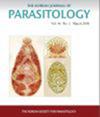韩国马的双胞虫基因型和感染。
IF 1.4
4区 医学
Q3 PARASITOLOGY
Korean Journal of Parasitology
Pub Date : 2021-12-01
Epub Date: 2021-12-22
DOI:10.3347/kjp.2021.59.6.639
引用次数: 2
摘要
双胞虫是一种微孢子虫病原体。最近,韩国的马术人口正在增加。与马有关的人畜共患病原体,包括布氏埃希氏体,是公共卫生关切的问题。在济州岛和内陆地区的骑马中心和饲养场共收集了1200份马粪便样本。15份(1.3%)粪便标本PCR阳性。有趣的是,所有阳性样本都来自济州岛。马驹腹泻与感染相关。两个基因型(马1、马2)被确定为可能的人畜共患群,需要持续监测。本文章由计算机程序翻译,如有差异,请以英文原文为准。

Enterocytozoon bieneusi Genotypes and Infections in the Horses in Korea.
Enterocytozoon bieneusi is a microsporidian pathogen. Recently, the equestrian population is increasing in Korea. The horse-related zoonotic pathogens, including E. bieneusi, are concerns of public health. A total of 1,200 horse fecal samples were collected from riding centers and breeding farms in Jeju Island and inland areas. Of the fecal samples 15 (1.3%) were PCR positive for E. bieneusi. Interestingly, all positive samples came from Jeju Island. Diarrhea and infection in foals were related. Two genotypes (horse1, horse2) were identified as possible zoonotic groups requiring continuous monitoring.
求助全文
通过发布文献求助,成功后即可免费获取论文全文。
去求助
来源期刊

Korean Journal of Parasitology
PARASITOLOGY-
CiteScore
2.80
自引率
0.00%
发文量
48
审稿时长
1 months
期刊介绍:
The Korean Journal of Parasitology is the official journal paperless, on-line publication after Vol. 53, 2015 of The Korean Society for Parasitology and Tropical Medicine. Abbreviated title is ‘Korean J Parasitol’. It was launched in 1963. It contains original articles, case reports, brief communications, reviews or mini-reviews, book reviews, and letters to the editor on parasites of humans and animals, vectors, host-parasite relationships, zoonoses, and tropical medicine. It is published bimonthly in February, April, June, August, October, and December each year. Supplement numbers are at times published. All of the manuscripts are peer-reviewed.
 求助内容:
求助内容: 应助结果提醒方式:
应助结果提醒方式:


